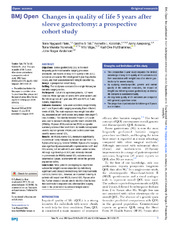| dc.contributor.author | Flølo, Tone Nygaard | en_US |
| dc.contributor.author | Tell, Grethe S. | en_US |
| dc.contributor.author | Kolotkin, Ronette Loganzo | en_US |
| dc.contributor.author | Aasprang, Anny | en_US |
| dc.contributor.author | Norekvål, Tone M. | en_US |
| dc.contributor.author | Våge, Villy | en_US |
| dc.contributor.author | Hufthammer, Karl Ove | en_US |
| dc.contributor.author | Andersen, John Roger | en_US |
| dc.date.accessioned | 2020-06-03T14:05:02Z | |
| dc.date.available | 2020-06-03T14:05:02Z | |
| dc.date.issued | 2019-09-12 | |
| dc.Published | Flølo TN, Tell GST, Kolotkin RL, Aasprang A, Norekvål TM, Våge V, Hufthammer KO, Andersen JR. Changes in quality of life 5 years after sleeve gastrectomy: A prospective cohort study. BMJ Open. 2019;9(9) | eng |
| dc.identifier.issn | 2044-6055 | |
| dc.identifier.uri | https://hdl.handle.net/1956/22451 | |
| dc.description.abstract | Objectives Sleeve gastrectomy (SG) is the most frequently performed bariatric surgery procedure worldwide, but reports on long-term quality of life (QOL) outcomes are scarce. We investigated 5-year trajectories in QOL and their associations with weight loss after SG. Design A prospective cohort study. Setting The study was conducted in a single Norwegian bariatric surgery centre. Participants Out of 150 operated patients, 127 were included. Mean age was 41 years, 68% were women and the follow-up rate at 1 year was 85% and 64% at 1 and 5 years, respectively. Outcome measures Data were collected preoperatively, and 1 and 5 years after surgery assessing three different levels of QOL. The main exposure was weight loss after SG, assessed as per cent excess body mass index (kg/m2) loss (%EBMIL). The Obesity-Related Problem (OP) scale was used to measure obesity-specific health-related QOL (HRQOL). Physical (PCS) and mental (MCS) composite summary scores of the Short Form 36 Health Survey were used to capture generic HRQOL and Cantril Ladder was used to assess overall QOL. Results All HRQOL/overall QOL measures significantly improved at 1 year, followed by modest decline from 1 to 5 years after surgery. Greater %EBMIL 5 years after surgery was significantly associated with improvements in OP and PCS scores, but not with MCS and Cantril Ladder scores. Although significant (p<0.001) and clinically relevant improvements in HRQOL/overall QOL outcomes were observed at 5 years, scores were still below the general population norms. Conclusion Most patients undergoing SG experience substantial weight loss accompanied by statistically significant and clinically relevant long-term improvements in HRQOL/overall QOL. However, an important minority of patients still report low HRQOL/overall QOL 5 years after SG. Further research should aim to identify other factors that contribute to impaired QOL after bariatric surgery, even in the presence of successful weight control. | en_US |
| dc.language.iso | eng | eng |
| dc.publisher | BMJ | eng |
| dc.rights | Attribution CC BY-NC | eng |
| dc.rights.uri | http://creativecommons.org/licenses/by-nc/4.0/ | eng |
| dc.title | Changes in quality of life 5 years after sleeve gastrectomy: A prospective cohort study | en_US |
| dc.type | Peer reviewed | |
| dc.type | Journal article | |
| dc.date.updated | 2020-01-28T09:23:06Z | |
| dc.description.version | publishedVersion | en_US |
| dc.rights.holder | Copyright 2019 The Author(s) | |
| dc.identifier.doi | https://doi.org/10.1136/bmjopen-2019-031170 | |
| dc.identifier.cristin | 1749063 | |
| dc.source.journal | BMJ Open | |
| dc.identifier.citation | BMJ Open 2019;9: e031170. | |

